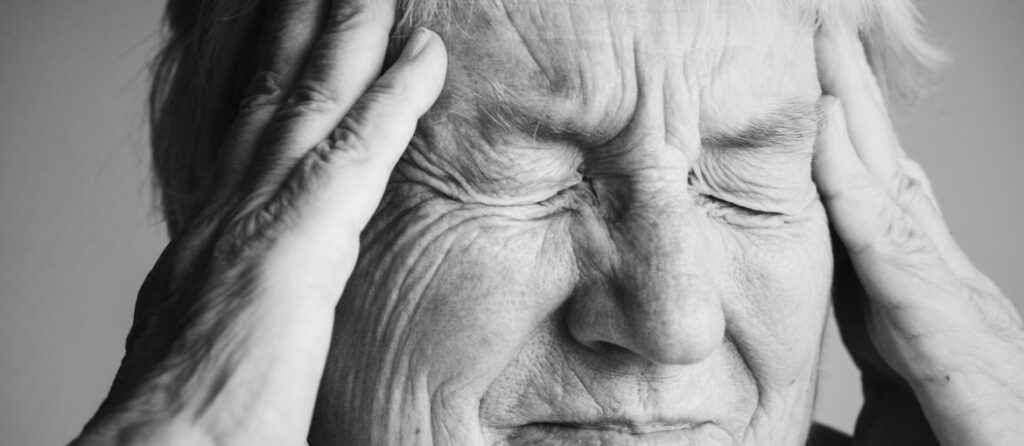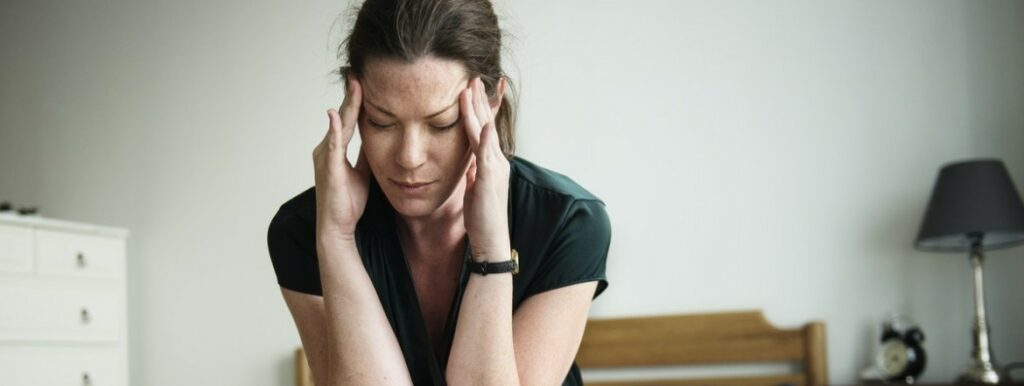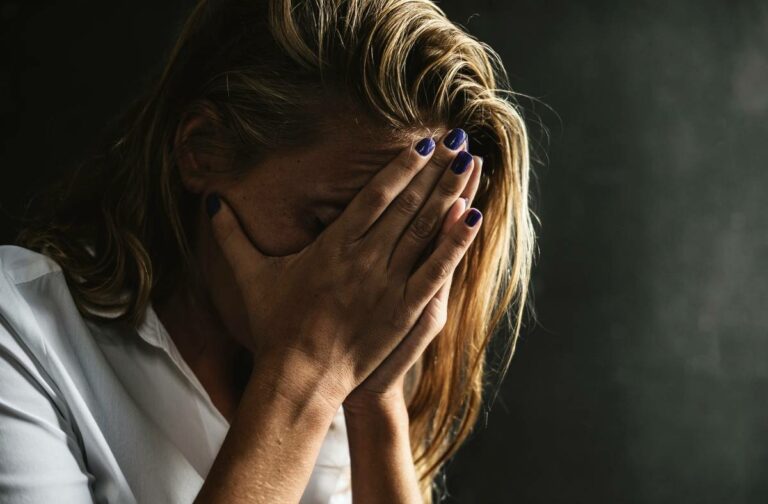Do you ever feel lightheaded? Do you sometimes see stars or black spots? Do you ever lose your balance and you feel like you’re going to pass out? Or is your hearing ever muffled? The dizziness usually quickly disappears after standing up.
Dizziness can also be paired with other complaints, such as sweating, nausea, headaches or fatigue. Dizziness is one of the many symptoms of too much stress or a burnout. It’s often the result of an abundance of information in your brain. But before you blame it on stress, it’s wise to also rule out other causes.
Function of the vestibular system
Another word for the vestibular system is the balance organ, which says it all. Thanks to the balance organ we are able to maintain a stable position and keep our balance. If this organ is disturbed, you feel dizzy. The balance organ, the eyes and the information of the muscles play a role in keeping your balance. These different sources of information sometimes don’t give uniform information to the brain, which can throw you off-balance. Think for instance of dizziness while standing up and dizziness while lying down or when you experience h2 emotions.
Suboptimal functioning of your balance organ can have many causes. It’s possible that certain medication causes you to lose balance, or a decrease in blood pressure or blood sugar level. Intensive exercise or a lack of oxygen could also lead to a lack of balance. It is also caused by circulatory disorders or Meniere’s disease. It’s advisable to first consult a doctor in order to rule out these possible causes.

Dizziness and stress
Stress can both be the cause and the result of dizziness. If dizziness is caused by one of the aforementioned physical causes, this could lead to stress. That’s because dizziness interferes with your daily life. Long-term stress is however also one of the major causes of dizziness.
When you’re stressed, your body is usually tenser and your brain is overactive. You have a stronger response to signals and stimuli. If your brain receives inadequate information, this could cause dizziness. Stress can furthermore lead to poor vision and therefore make you feel dizzy.
Read more: Relaxation exercises | 10 exercises for more rest
Dizziness and burnout
When you experience a burnout, the signals that come in are disturbed. These disturbances cause dizziness. Your brain doesn’t know what your body has to do to stay balanced. It tries to process the different signals into a usable signal, which can cause you to feel dizzy.
People with a burnout can experience dizziness and fatigue after the slightest effort. It’s a sign from your body that tells you to stop and take a rest. If you continue you risk a burnout or risk your burnout will last longer.
Dizziness and hyperventilating
Dizziness related to stress or a burnout can also be caused by hyperventilating. People sometimes tend to literally and figuratively take some rest and catch one’s breath after working hard. Always having your foot on the gas and not timely slamming the brakes negatively affects your breathing, because it adapts to your pace.
You will start to breathe more than the healthy pace of eight inhales and exhales a minute. You won’t see or notice it from the outside, but you’ll start to breathe faster and more shallow than normal. When we breathe too fast, we lose too much carbon dioxide because we keep refreshing the air. This causes physical complaints. Stress moreover leads to a higher blood pressure and a faster heartbeat.
Hyperventilating is one of the causes of dizziness. But it also has other, scary symptoms that cause anxiety and unrest, such as chest pains, a tight chest, shortness of breath, fatigue and excessive sweating.
If you suffer from hyperventilation, it’s important to start doing breathing exercises. You can read all about this ailment in the article on hyperventilation, alongside exercises to help you regain control over your breathing.
Read more: Hyperventilation and incorrect breathing: how do you deal wit this?

Dizziness can cause a panic attack
Anxiety and stress are the two most common causes general practitioners hear from people who suffer from dizziness. A hyperventilation attack can cause so much anxiety and tension that it’s followed by a panic attack.
Everyone who’s had a panic attack will confirm this: it’s an awful feeling during which you’re overcome by fear. You’re no longer able to think straight; you just want to hide, run or look for help. It’s an overwhelming avalanche of emotions that completely exhausts you. Since the symptoms of a panic attack h2ly resemble those of a heart attack, people sometimes even visit the emergency room. Symptoms include heart palpitations, chest pain, excessive sweating, shortness of breath, nausea and for instance a fear of fainting.
Have you ever experienced such an intense panic attack and do you want to learn more about it? We will tell you all about it in our article on panic attacks.
Dizziness and headaches
Do you suffer from bursts of dizziness prior to intense headaches? Then the culprit is a migraine. The exact cause of migraines is still unclear. The complaints are usually contributed to stress, but this is now outdated. In fact, stress is actually an alarm signal that tells you a migraine is coming your way. This is also the case if you feel restless or gloomy in the days before a migraine. The Nederlandse Tijdschrift voor Geneeskunde (Dutch Journal for Medicine) recently described an extensive study on dizziness. Researchers were able to show that migraines are an important cause of fits of vertigo, also without the intense headaches that follow.

Dizziness and nausea
Nausea and dizziness are two symptoms of overtiredness. Do you feel like you’ve just run a marathon after waking up in the morning? Do you drag yourself through the day while being extremely tired and lethargic? Please consult a doctor. It’s very important to tackle your complaints, because overtiredness is a foreshadow of becoming overstrained or even burned out
In our article on overtiredness you can read all about the many symptoms of this condition. We also provide tips on the best things you can do when dealing with overtiredness.
Dizziness and the elderly
Many older people experience dizziness. They feel unsteady while standing, or light-headed. It’s more difficult to find a clear in older people, because usually multiple complaints play a role. The most common causes of dizziness at a later age are a poor physical condition, weaker muscles, a worsened sense of balance and poor vision. Medicine can also contribute to the feeling of dizziness, which is a side-effect of certain drugs. This is stated in the package leaflet.
We unfortunately have had to add two common causes to this list in recent years: loneliness and anxiety. Loneliness causes sombreness and depression. The fatigue related to this could lead to a floating feeling or dizziness. Older people who live alone, often worry more.
Minor setbacks in daily life can cause emotions to run high because of anxiety and tension. This can lead to a slower or faster heartbeat, which causes a feeling of light-headedness. If tensions run very high, one can even faint.
Do you experience these complaints and do you worry a lot? Talk about it with your loved ones and ask your doctor for advice. They will gladly help you overcome your complaints
Can we help you?
Leave us your information and one of our coaches will contact you.

Dizziness, what to do?
In order to combat dizziness, you will first have to know its cause. It’s however clear you will be able to better deal with dizziness if you’re fit, relaxed and well-rested. So, these tips apply to everyone:
- Stay busy once you feel a bit better and don’t succumb to pessimism
- By being physically active at least thirty minutes a day you stay in shape. Getting some fresh air also works wonders!
- Eat healthily, don’t smoke, don’t drink alcohol and don’t do drugs
- Make sure you have a good night’s sleep and sufficient relaxation

Solving dizziness related to stress or burnout
Dizziness is only one of the symptoms of a burnout. If you want to solve dizziness related to stress or a burnout, it’s best to solve all burnout symptoms. Tackling the symptoms is often short-lived and not lasting. Solving dizziness related to a burnout?
Recovering under the supervision of a professional coach
Recovering from a burnout is a challenging task. With our online coaching we open the door to your recovery. We move through three stages: the acceptance stage, the recovery stage and the doing stage.
Since nature lends us a helping hand, we would like to go into nature with you. We can walk or jog, whatever you want. We don’t believe in sitting and listening, but in doing.
It’s always a huge relief when the symptoms are recognised by our coaching. That makes talking about sensitive topics a lot easier.

Training and coaching
Milltain provides training and coaching for private individuals and organisations. Our team consists of 35 coaches and trainers who have now helped thousands of people struggling with stress and burnouts.
Milltain for private individuals:
Are you stuck in life because of stress or a burnout? We developed an effective online programme that is fully focused on the complete recovery from a burnout. More than 2000 people have successfully completed this training!
Movement and nature play prominent roles in this training. Recovery is a process that contains peaks and troughs, and that’s something we know all about. Our highly experienced coaches provide you with active support.
Learn more: Stress and burnout coaching
Conquer burnout and stress
Reducing stress and recovering from burnout can be quite the challenge. With the help of our professional coaches, we are convinced that a full recovery is within reach. Our years of experience has taught us what stepping stones will help you reach your goal more effectively and how to make sure the changes you make will be of help to you for the rest of your life. Let’s turn your burnout or stress into your best life ever.
Please check out our 3-step process:





